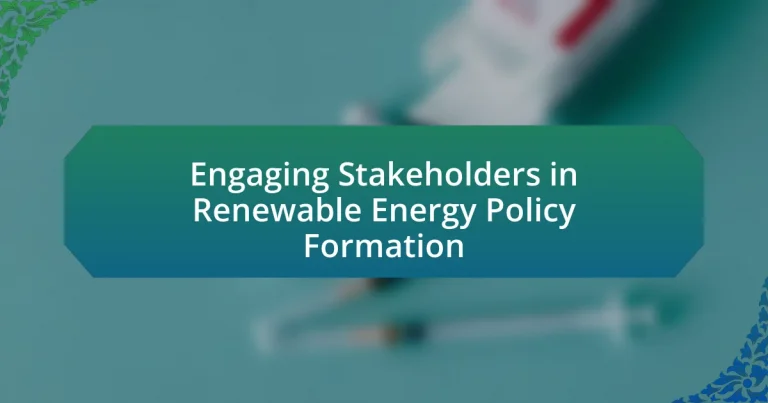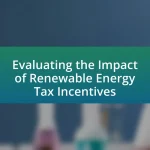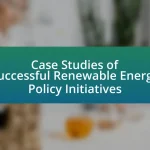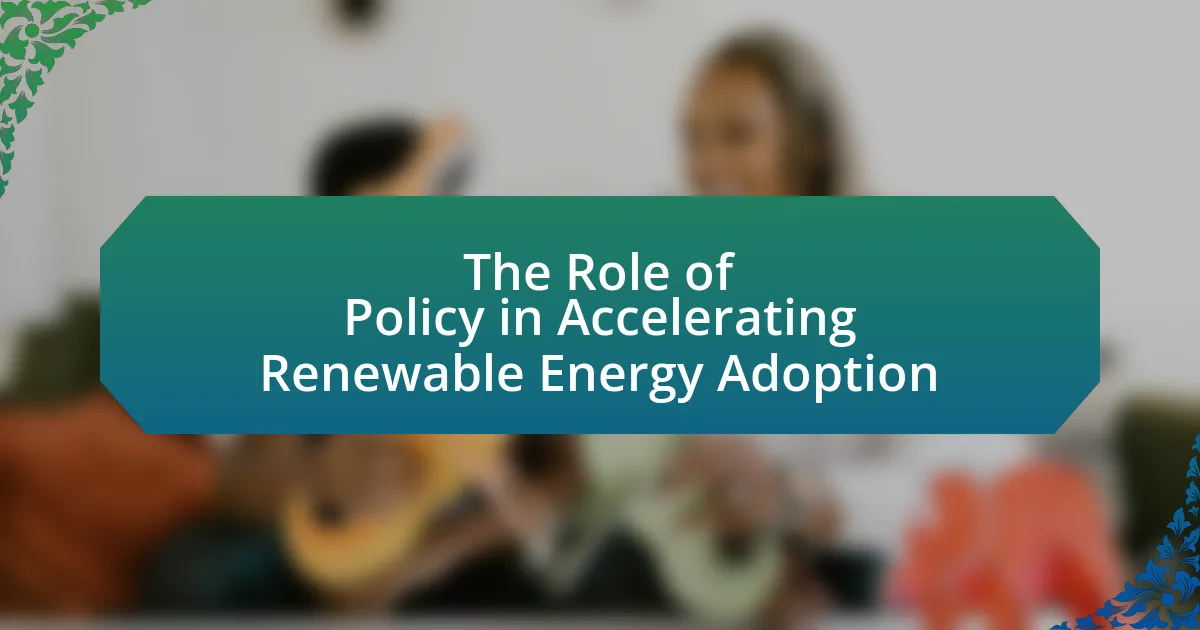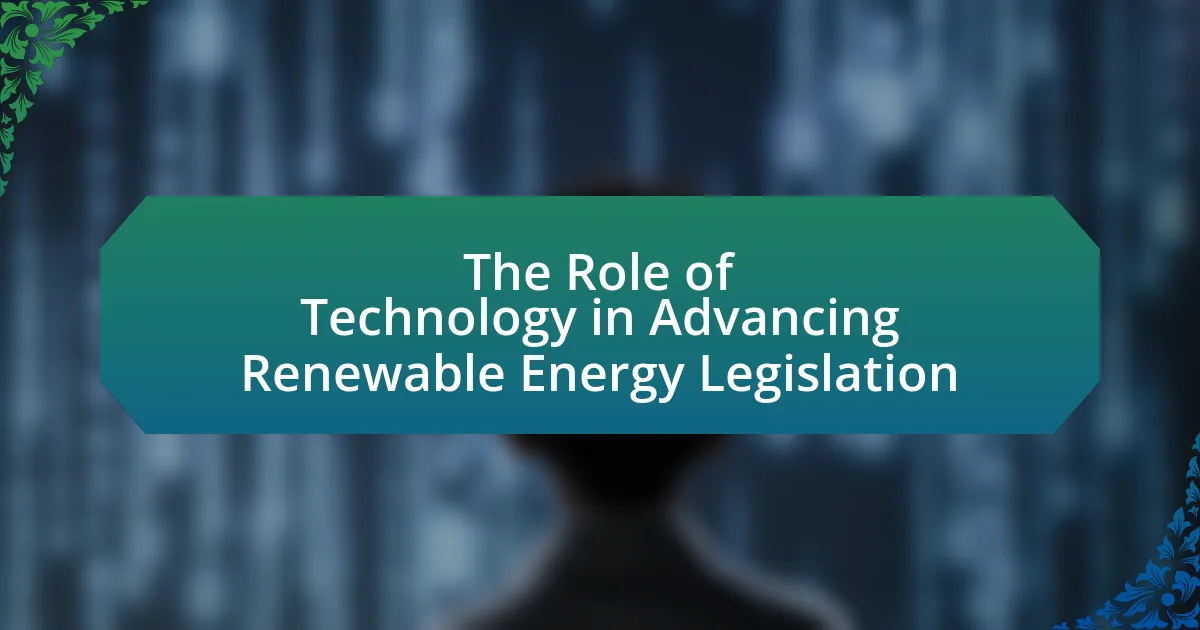Engaging stakeholders in renewable energy policy formation is a critical process that involves the active participation of individuals, groups, and organizations affected by renewable energy initiatives. This article outlines the importance of stakeholder engagement in creating inclusive and effective policies, highlighting the roles of various stakeholders, the influence of engagement on policy outcomes, and the challenges faced in the process. It also discusses strategies for enhancing participation, the role of technology, and best practices for successful engagement, emphasizing that effective stakeholder involvement leads to improved policy acceptance and project success. Additionally, the article examines the risks associated with neglecting stakeholder engagement and provides practical tips for fostering collaboration in renewable energy policy development.
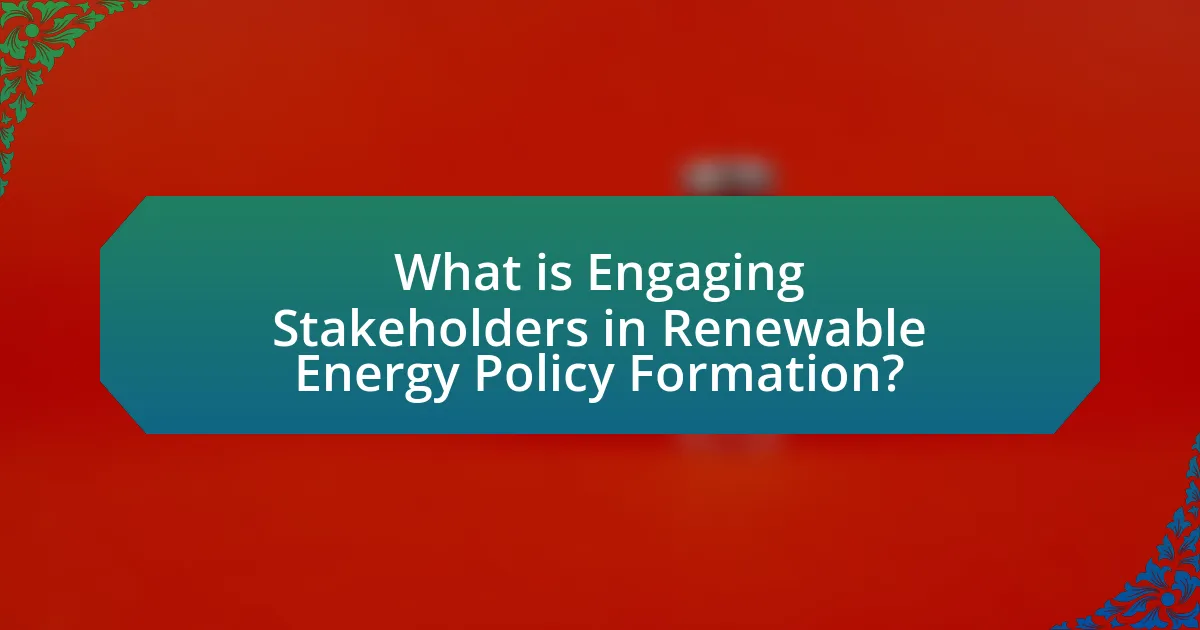
What is Engaging Stakeholders in Renewable Energy Policy Formation?
Engaging stakeholders in renewable energy policy formation involves actively involving individuals, groups, and organizations that have an interest in or are affected by renewable energy initiatives in the decision-making process. This engagement is crucial for ensuring that policies are inclusive, effective, and reflective of diverse perspectives. Research indicates that stakeholder engagement can lead to better policy outcomes, as it fosters collaboration, enhances transparency, and builds trust among parties involved. For instance, the International Renewable Energy Agency (IRENA) emphasizes that stakeholder participation is essential for the successful implementation of renewable energy projects, as it helps to identify potential barriers and opportunities within local contexts.
Why is stakeholder engagement crucial in renewable energy policy formation?
Stakeholder engagement is crucial in renewable energy policy formation because it ensures that diverse perspectives and interests are considered, leading to more effective and inclusive policies. Engaging stakeholders, including local communities, industry representatives, and environmental groups, fosters collaboration and builds trust, which is essential for the successful implementation of renewable energy initiatives. Research indicates that policies developed with stakeholder input are more likely to gain public support and achieve desired outcomes, as evidenced by case studies showing increased project acceptance and reduced opposition when stakeholders are involved early in the decision-making process.
What roles do different stakeholders play in the policy formation process?
Different stakeholders play crucial roles in the policy formation process by influencing, shaping, and implementing policies. Government agencies establish regulatory frameworks and provide funding, while non-governmental organizations advocate for environmental and social considerations. Industry representatives contribute technical expertise and economic perspectives, and community members offer local insights and needs. Academic institutions conduct research that informs policy decisions, ensuring evidence-based approaches. Each stakeholder’s involvement is essential for creating balanced and effective renewable energy policies, as demonstrated by the collaborative efforts seen in successful initiatives like California’s Renewable Portfolio Standard, which involved diverse stakeholder engagement to achieve its goals.
How does stakeholder engagement influence policy outcomes?
Stakeholder engagement significantly influences policy outcomes by ensuring that diverse perspectives are considered, which leads to more effective and accepted policies. Engaging stakeholders, such as community members, industry representatives, and environmental groups, fosters collaboration and builds trust, ultimately resulting in policies that are more likely to be implemented successfully. For instance, research by the International Renewable Energy Agency (IRENA) highlights that inclusive stakeholder processes in renewable energy projects can enhance project viability and public support, as seen in successful wind energy initiatives in Denmark, where local engagement led to higher acceptance rates and smoother project execution.
What are the key challenges in engaging stakeholders?
The key challenges in engaging stakeholders include diverse interests, communication barriers, and varying levels of influence. Diverse interests arise when stakeholders have conflicting priorities, making consensus difficult. Communication barriers can stem from technical jargon or differing cultural contexts, hindering effective dialogue. Additionally, varying levels of influence among stakeholders can lead to power imbalances, where more influential parties dominate discussions, marginalizing less powerful voices. These challenges complicate the collaborative process essential for effective renewable energy policy formation.
How do differing interests among stakeholders affect engagement?
Differing interests among stakeholders significantly affect engagement by creating conflicts that can hinder collaboration and decision-making. When stakeholders prioritize their own objectives, such as economic gain, environmental protection, or social equity, it leads to divergent viewpoints that complicate consensus-building. For instance, a study by the International Renewable Energy Agency (IRENA) highlights that conflicting interests can result in stakeholders being less willing to participate in discussions, ultimately slowing down the policy formation process. This dynamic illustrates how the lack of alignment among stakeholder interests can diminish overall engagement and impede effective renewable energy policy development.
What barriers exist in the communication between stakeholders?
Barriers in communication between stakeholders include differing priorities, lack of trust, and inadequate information sharing. Differing priorities arise when stakeholders have conflicting goals, such as economic versus environmental concerns, which can hinder collaborative dialogue. Lack of trust often stems from past experiences or perceived power imbalances, leading to reluctance in sharing critical information. Inadequate information sharing occurs when stakeholders do not have access to relevant data or fail to communicate effectively, resulting in misunderstandings and misaligned objectives. These barriers can significantly impede the development of cohesive renewable energy policies.
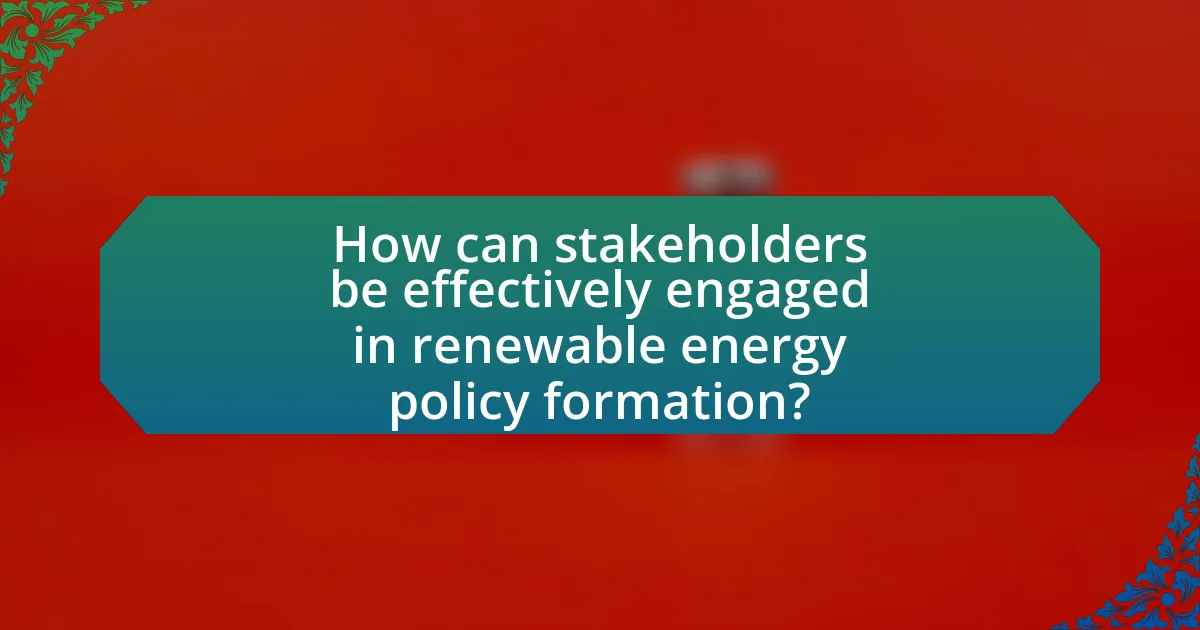
How can stakeholders be effectively engaged in renewable energy policy formation?
Stakeholders can be effectively engaged in renewable energy policy formation through inclusive dialogue and participatory processes. This engagement involves identifying key stakeholders, such as local communities, industry representatives, and environmental organizations, and facilitating their active participation in discussions and decision-making. Research indicates that when stakeholders are involved early in the policy development process, it leads to more comprehensive and accepted policies, as seen in the case of the European Union’s Renewable Energy Directive, which incorporated feedback from various stakeholders to enhance policy effectiveness.
What strategies can be employed to enhance stakeholder participation?
To enhance stakeholder participation in renewable energy policy formation, strategies such as inclusive dialogue, transparent communication, and capacity building can be employed. Inclusive dialogue involves actively engaging diverse stakeholders in discussions, ensuring that all voices are heard and considered, which fosters a sense of ownership and commitment to the policy outcomes. Transparent communication ensures that stakeholders are informed about the processes, decisions, and implications of policies, which builds trust and encourages active involvement. Capacity building focuses on equipping stakeholders with the necessary knowledge and skills to participate effectively, thereby empowering them to contribute meaningfully to the policy-making process. These strategies are supported by research indicating that stakeholder engagement leads to more effective and accepted policies, as seen in case studies from various renewable energy initiatives globally.
How can technology facilitate stakeholder engagement?
Technology can facilitate stakeholder engagement by providing platforms for real-time communication and collaboration. These platforms, such as online forums, social media, and project management tools, enable stakeholders to share insights, feedback, and concerns efficiently. For instance, a study by the International Renewable Energy Agency (IRENA) highlights that digital tools can enhance transparency and inclusivity in decision-making processes, allowing diverse stakeholder voices to be heard. Furthermore, data analytics can identify stakeholder preferences and engagement patterns, leading to more tailored and effective communication strategies.
What role do public consultations play in the engagement process?
Public consultations serve a critical role in the engagement process by facilitating direct communication between policymakers and stakeholders. They provide a platform for stakeholders, including community members, industry representatives, and advocacy groups, to express their views, concerns, and suggestions regarding renewable energy policies. This interaction enhances transparency and fosters trust, as stakeholders feel their input is valued and considered in decision-making. Research indicates that effective public consultations can lead to more informed and accepted policies, as evidenced by case studies where stakeholder feedback directly influenced policy adjustments, resulting in higher community support and successful implementation of renewable energy initiatives.
What best practices should be followed for successful stakeholder engagement?
Successful stakeholder engagement requires clear communication, active listening, and inclusive participation. Clear communication ensures that stakeholders understand the objectives and processes involved in renewable energy policy formation. Active listening allows stakeholders to voice their concerns and suggestions, fostering a collaborative environment. Inclusive participation involves engaging diverse groups, including local communities, industry representatives, and environmental organizations, to gather a wide range of perspectives. Research indicates that projects with effective stakeholder engagement are 30% more likely to succeed, as highlighted in the “Stakeholder Engagement: A Good Practice Handbook for Companies Doing Business in Emerging Markets” by the International Finance Corporation.
How can transparency be maintained throughout the engagement process?
Transparency can be maintained throughout the engagement process by ensuring open communication, providing accessible information, and involving stakeholders in decision-making. Open communication fosters trust and allows stakeholders to voice their concerns and opinions, which is essential for effective engagement. Providing accessible information, such as project updates and relevant data, ensures that all stakeholders have the necessary context to understand the engagement process. Involving stakeholders in decision-making not only enhances transparency but also empowers them, leading to more informed and collaborative outcomes. Research indicates that transparency in stakeholder engagement can lead to increased public trust and better policy outcomes, as seen in various renewable energy initiatives globally.
What methods can be used to gather stakeholder feedback effectively?
Surveys and interviews are effective methods to gather stakeholder feedback. Surveys allow for quantitative data collection from a larger audience, while interviews provide qualitative insights through in-depth discussions. According to a study published in the Journal of Renewable Energy Policy, utilizing mixed methods, such as combining surveys with focus groups, enhances the richness of feedback and ensures diverse stakeholder perspectives are captured. This approach has been shown to improve stakeholder engagement and satisfaction in renewable energy policy formation.
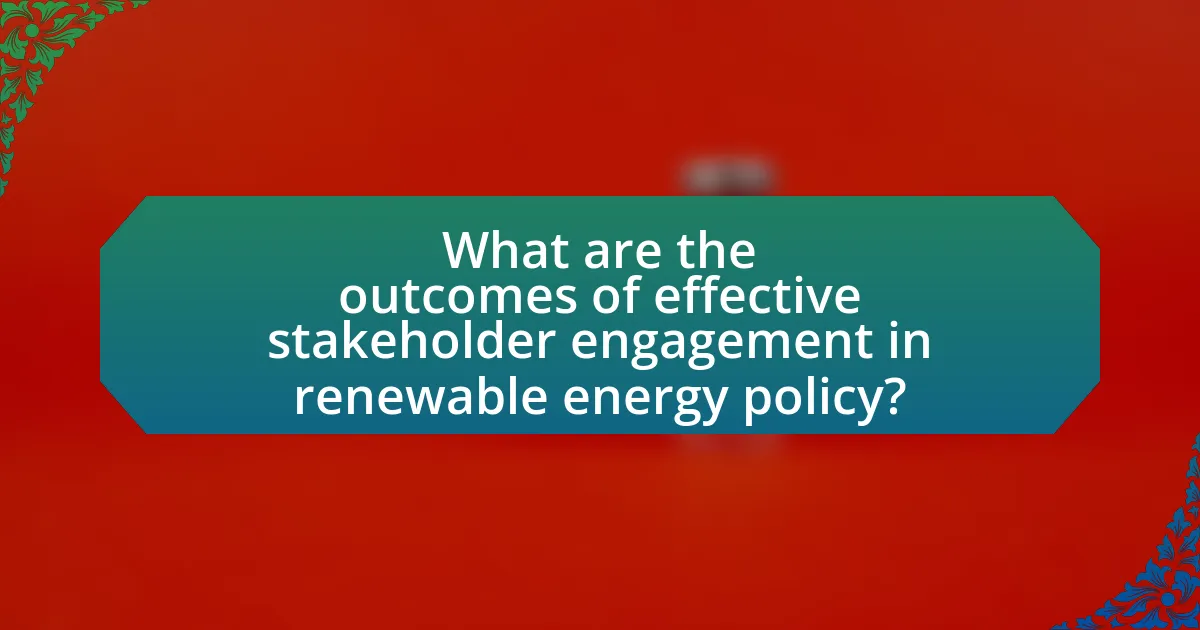
What are the outcomes of effective stakeholder engagement in renewable energy policy?
Effective stakeholder engagement in renewable energy policy leads to enhanced policy acceptance and improved project outcomes. Engaging stakeholders fosters collaboration, ensuring that diverse perspectives are considered, which can result in more comprehensive and effective policies. For instance, studies have shown that projects with strong stakeholder involvement experience higher rates of success and community support, as evidenced by a report from the International Renewable Energy Agency, which highlights that inclusive decision-making processes can reduce conflicts and increase the likelihood of project implementation. Additionally, effective engagement can lead to innovative solutions and increased investment, as stakeholders often bring valuable insights and resources to the table.
How does stakeholder engagement impact policy effectiveness?
Stakeholder engagement significantly enhances policy effectiveness by ensuring that diverse perspectives and expertise are incorporated into the decision-making process. Engaging stakeholders, such as community members, industry representatives, and environmental groups, leads to more informed policies that reflect the needs and values of those affected. Research indicates that policies developed with stakeholder input are more likely to gain public support and compliance, as evidenced by a study published in the journal “Energy Policy,” which found that inclusive engagement processes resulted in a 30% increase in policy acceptance among local communities. This demonstrates that effective stakeholder engagement not only improves the quality of policy outcomes but also fosters trust and collaboration, ultimately leading to more sustainable and successful implementation of renewable energy initiatives.
What examples demonstrate successful stakeholder engagement in renewable energy policies?
Successful stakeholder engagement in renewable energy policies is exemplified by the California Renewable Energy Action Team (REAT), which includes diverse stakeholders such as state agencies, local governments, and environmental organizations. This collaborative approach has led to the development of comprehensive policies that promote renewable energy deployment while addressing environmental concerns. Additionally, the European Union’s Renewable Energy Directive involved extensive consultations with industry representatives, NGOs, and member states, resulting in a cohesive framework that supports renewable energy growth across Europe. These examples illustrate how inclusive stakeholder engagement can lead to effective and widely accepted renewable energy policies.
How can lessons learned from past engagements inform future policies?
Lessons learned from past engagements can inform future policies by providing empirical evidence of what strategies were effective or ineffective in stakeholder collaboration. For instance, analyzing previous renewable energy initiatives, such as the California Solar Initiative, reveals that inclusive stakeholder engagement led to higher adoption rates and smoother implementation processes. This historical data demonstrates that policies designed with input from diverse stakeholders, including local communities and industry experts, are more likely to address real-world challenges and foster broader support. By systematically reviewing these past engagements, policymakers can identify best practices and potential pitfalls, ensuring that future policies are more robust and responsive to stakeholder needs.
What are the implications of neglecting stakeholder engagement?
Neglecting stakeholder engagement in renewable energy policy formation can lead to significant negative consequences, including project delays, increased costs, and public opposition. When stakeholders, such as local communities, businesses, and environmental groups, are not involved in the decision-making process, their concerns and insights are overlooked, which can result in policies that are misaligned with community needs and values. For instance, a study by the International Renewable Energy Agency (IRENA) found that projects with strong stakeholder engagement are 30% more likely to succeed, highlighting the importance of collaboration. Additionally, failure to engage stakeholders can lead to a lack of trust and transparency, ultimately undermining the legitimacy of the policy and leading to potential legal challenges or protests.
How can lack of engagement lead to policy failure?
Lack of engagement can lead to policy failure by resulting in insufficient stakeholder input, which is critical for effective policy development. When stakeholders, such as community members, industry representatives, and experts, are not actively involved, policies may not address the actual needs or concerns of those affected. For instance, a study by the International Renewable Energy Agency (IRENA) found that inclusive stakeholder engagement significantly improves the acceptance and effectiveness of renewable energy policies. Without this engagement, policies may face resistance, lack legitimacy, and ultimately fail to achieve their intended outcomes, as evidenced by numerous failed renewable energy initiatives that did not consider local perspectives or expertise.
What risks do policymakers face when stakeholders are not involved?
Policymakers face significant risks when stakeholders are not involved, including the potential for ineffective policies, lack of public support, and increased opposition. Without stakeholder engagement, policies may not address the actual needs or concerns of the community, leading to ineffective implementation. For instance, research by the International Renewable Energy Agency indicates that inclusive policy processes enhance the likelihood of successful renewable energy projects. Additionally, the absence of stakeholder input can result in a lack of transparency and trust, which can diminish public support and lead to protests or legal challenges against the policies. This underscores the importance of stakeholder involvement in creating effective and widely accepted renewable energy policies.
What practical tips can enhance stakeholder engagement in renewable energy policy formation?
To enhance stakeholder engagement in renewable energy policy formation, it is essential to establish clear communication channels. Effective communication fosters transparency and trust, which are critical for stakeholder involvement. Engaging stakeholders early in the policy development process allows for their input and concerns to be addressed, leading to more comprehensive and accepted policies. Additionally, utilizing diverse engagement methods, such as workshops, surveys, and public forums, ensures that various perspectives are considered, thereby enriching the policy-making process. Research indicates that inclusive stakeholder engagement can lead to higher satisfaction and better policy outcomes, as seen in case studies from countries that have successfully implemented renewable energy initiatives.
